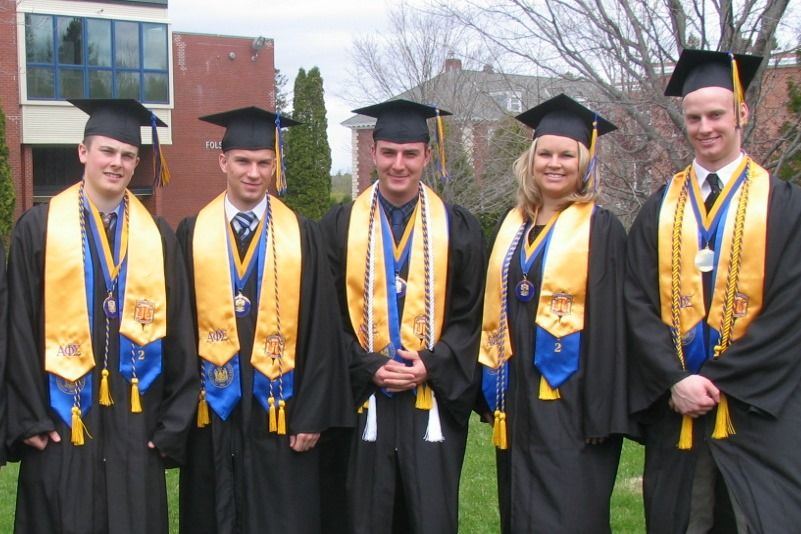Also Available
Online Bachelor of Arts in Criminal Justice

Service Learning
Our students learn by doing projects that impact our state, such as efforts meant to help women re-enter society after being incarcerated.
Criminal Justice Club
Our club tackles service projects and goes on two major trips a year, to spots like Washington, D.C., where students took part in a specialized law enforcement training at the National Holocaust Museum.


Honor Society
There are only two Alpha Phi Sigma chapters in the state of Maine, and we’re proud to be home to one of them.
Front and Center
In our program, you get the unique opportunity to present at professional Criminal Justice conferences.

Senior Portfolio
All Criminal Justice B.A. students are required to complete a Portfolio in their senior year. The Portfolio is a collection of work completed in several classes that represent the students’ accumulation of knowledge. Specifically the work included in the Portfolio will be connected to the Learning Outcomes for the Criminal Justice Major.
Internships
In their senior year Criminal Justice students can apply for a field experience position. Students should meet with Dr. Lisa Leduc (lisa.leduc@maine.edu) in their junior year to discuss their application and internship goals.
Through internships within Criminal Justice and Social Service agencies, students will be given the opportunity to connect theory with practice and to acquire knowledge and skills directly related to various activities within the discipline.
LEPS – 200 Hours Course
The Criminal Justice Academy Preservice Course is a 200 hour course that qualifies participants to be a part-time or reserve law enforcement officer in the State of Maine (indefinitely); or a full-time officer for no more than one year. UMPI students can get three credit hours of elective transfer credits for the Preservice course.
For more information about this course, please visit the Maine Criminal Justice Academy website.
Frequently Asked Questions
Yes! Although over half of our students are interested in law enforcement, the Criminal Justice program prepares its graduates to work in all facets of criminal justice and social services including programs for youth at risk; victims of violence; probation; corrections and the court system.
The Associates degree is a two-year program that prepares students for entry level positions in local criminal justice agencies. To be competitive for opportunities in state and federal positions, a Bachelor’s degree is recommended. A Bachelor’s degree is frequently required for promotion to command level positions. Many agencies also offer a pay differential based on years of education completed.
Yes. Almost 85% of our A.A. students continue on to complete their B.A.. In many ways, the Associates is the first half of the Bachelors program.
English, English, English! The coursework in Criminal Justice is very writing intensive so a good grounding in English (especially college preparatory or advanced placement) will help. Do not worry if that is not your strongest class however, we have a Writing Center and peer tutors to help you become a better writer. Any classes on American Government will also prepare you for your Constitutional and Criminal Law courses.
There are various opportunities for students to become Academy trained while completing their degree. The Preservice (100 hours) course is offered on site at UMPI or the Presque Isle Police Department and students can transfer in three general elective credits for that certification. Students may also pursue full academy training in their senior year for up to 12 credits.
While Criminology programs offer a broad theoretical understanding of crime founded in sociology, the Criminal Justice program at UMPI combines that macro base with a more grounded applied curriculum analyzing the day-to-day workings of the criminal justice system.
Our graduates are working in various state and federal law enforcement agencies including: the Secret Service; Customs & Border Protection; Border Patrol; Maine Warden Service; Maine State Police, as well as various local departments across the state and beyond. We also have graduates working in a range of other non-policing agencies including: Domestic Violence Shelters; Department of Health and Human Services; Catholic Charities Maine; Department of Corrections; Probation and Parole.
This Criminal Justice program is unlike any found in Canada because it combines the broad liberal arts base taught by doctoral trained faculty that you would find in Canadian universities, with the practical applications that are usually only offered in Canadian community colleges.
As we are located only 15 miles from the border of New Brunswick, we have several Canadian students and have tailored flexibility into our course work to meet their needs. Along with a Canadian Criminal Justice course, we also have internship opportunities with Canadian Customs and the RCMP.
This explains what Academic Maps are.
Complete courses at your pace and move on to the next in the same session. With 6 session starts a year, you can customize your workload and earn credits faster to fit your needs and busy schedule.
To view more information and program requirements, see the Course Catalog
Our graduates find opportunities in the expanding field of criminal justice at the local, state and federal levels, as well as the many private and non-profit organizations which provide services or make policy recommendations to traditional criminal justice agencies. The Criminal Justice B.A. also provides a strong foundation for students pursuing graduate work including law school.
Our Criminal Justice program prepares students for future careers as a(n):
- Law enforcement officer
- Social and human services specialist
- Parole officer
- Juvenile probation counselor
- Fire marshal
- Public safety officer
- Corrections officer
- Private investigator
- Paralegal


